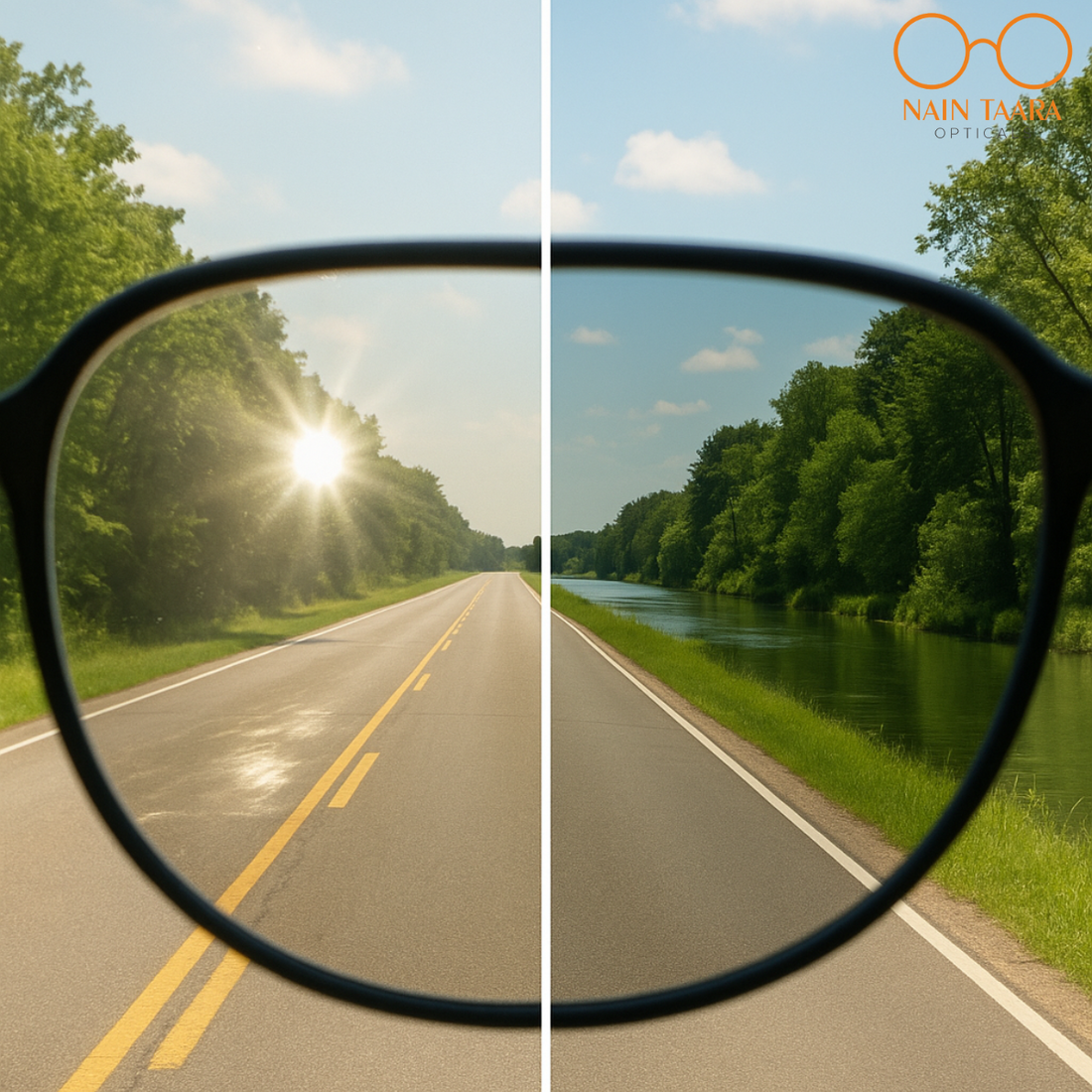
Share
Sunglasses are more than just a style statement-they’re essential for protecting your eyes. Whether you’re driving on a sunny day, heading out for a beach vacation, or simply walking in the park, the right pair of sunglasses can make a huge difference in comfort, safety, and long-term eye health. But here’s the catch: not all sunglasses are created equal. One of the most common questions people ask at NainTaara Opticals is-What’s the difference between polarized and non-polarized sunglasses?
Let’s break it down in the simplest way possible.

What Are Polarized Sunglasses?
Polarized sunglasses are specially designed to reduce glare. Think about the time you were driving and the sunlight bounced off the car’s windshield, or when you looked at water and couldn’t see past the shiny surface. That blinding reflection is called glare.
Polarized lenses have a special chemical filter that blocks this reflected light. Imagine them as a tiny window blind for your eyes-they let in useful light but cut out the harsh, distracting glare.
Benefits of Polarized Sunglasses
-
Reduces glare: Perfect for driving, water sports, or snow activities.
-
Better clarity: Colors appear sharper and more vibrant.
-
Less eye strain: Long outdoor hours feel more comfortable.
-
Safer vision: Helps you spot details (like potholes or obstacles) in bright conditions.
 In short, polarized sunglasses make the world look calmer, clearer, and safer.
In short, polarized sunglasses make the world look calmer, clearer, and safer.
What About Non-Polarized Sunglasses?
Non-polarized sunglasses are the standard kind most people wear. They reduce the overall brightness of sunlight, protecting your eyes from harmful UV rays, but they don’t filter glare the way polarized lenses do.
Benefits of Non-Polarized Sunglasses
-
Affordable: Usually less expensive than polarized options.
-
Good for everyday use: Protects from UV rays and reduces brightness.
-
Neutral in digital use: Easier to see screens on phones, tablets, and car dashboards (polarized lenses sometimes make them harder to read).
Limitations
-
Don’t block glare-so driving, skiing, or fishing might still feel uncomfortable.
-
Less visual comfort in very bright, reflective conditions.
Quick Comparison: Polarized vs Non-Polarized Sunglasses
| Feature | Polarized Sunglasses | Non-Polarized Sunglasses |
|---|---|---|
| Glare Protection |
 Blocks glare from water, roads, glass, snow Blocks glare from water, roads, glass, snow |
 No glare protection No glare protection |
| UV Protection |
 Available with UV protection Available with UV protection |
 Available with UV protection Available with UV protection |
| Visual Comfort |
 Reduces eye strain, improves clarity Reduces eye strain, improves clarity |
 Reduces brightness but glare may remain Reduces brightness but glare may remain |
| Screen Visibility |
 Can make digital screens harder to read Can make digital screens harder to read |
 Easier to view digital devices Easier to view digital devices |
| Best For | Driving, fishing, sports, beach, snow | Everyday casual wear, budget-friendly options |
When Should You Choose Polarized or Non-Polarized?
Your choice depends on your lifestyle and needs:
Driving: Polarized sunglasses help reduce glare from windshields and roads- safer for long trips.
Water Sports & Fishing: A must-have! They cut surface glare, so you can see below the water.
Snow Sports (skiing, snowboarding): Polarized lenses reduce glare from snow, giving better depth perception.
Everyday Casual Use: Non-polarized sunglasses are perfectly fine for regular city wear and short outings.
Screen-Heavy Situations: If you need to constantly check digital screens while outdoors, non-polarized may be easier.
Busting Common Myths About Polarized Sunglasses
1.Myth: Polarized sunglasses are only for people with eye problems.
Truth: Anyone exposed to bright light or glare can benefit.
2.Myth: Polarized lenses are the same as UV protection.
Truth: Not true. Polarization reduces glare, while UV protection shields your eyes from harmful ultraviolet rays. You need both for full safety.
3.Myth: Polarized sunglasses are always expensive.
Truth: While they can cost more, there are affordable options that balance quality and price.
Simple Test to Check if Sunglasses Are Polarized
Here’s a quick trick you can do at home:
Hold the sunglasses in front of a computer or phone screen.
Rotate them slowly at a 90-degree angle.
If the lenses go dark or black out at some point, they are polarized!
Final Thoughts
Choosing between polarized and non-polarized sunglasses isn’t about which is “better” – it’s about what suits your lifestyle. If you’re always outdoors, driving, or near water, polarized sunglasses are worth it. For everyday casual wear, non-polarized sunglasses still protect your eyes well.
At NainTaara Opticals, we believe sunglasses should protect your eyes and match your style. Whether you need expert advice on which type to pick or want to try out different lens options, our team is here to guide you. After all, your eyes deserve the best care and the best look!
